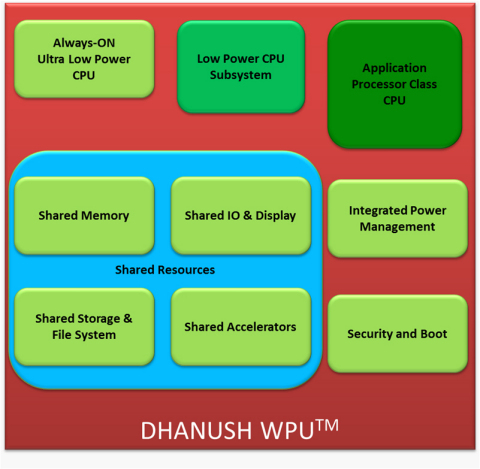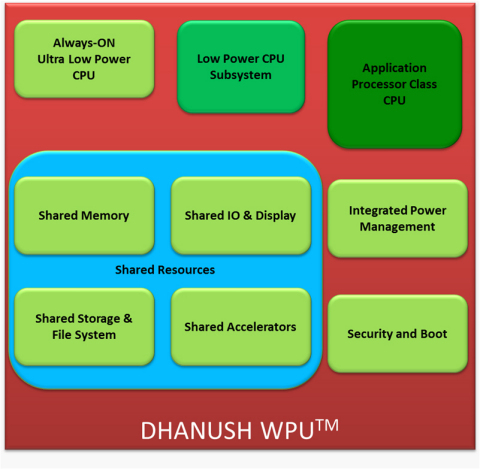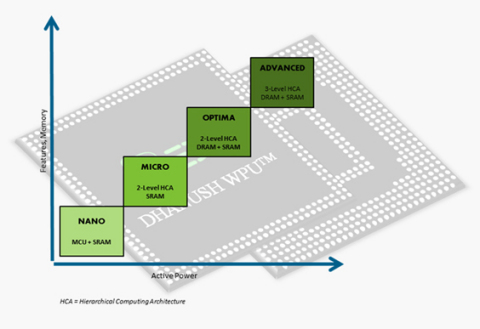SANTA CLARA, Calif.--(BUSINESS WIRE)--Ineda Systems, a leader of low-power SoCs (system on a chip) for use in both consumer and enterprise applications, today announced its Dhanush family of Wearable Processing Units (WPU™). The Dhanush WPU family supports a large range of wearable devices including fitness bands, smart watches, glasses, athletic video recorders and the Internet of Things. The Dhanush WPUs will enable a new industry milestone for always-on battery life of up to one month.
The Dhanush WPU is powered by Ineda’s patent pending Hierarchical Computing architecture. Dhanush is sampling to tier-one customers now, and will be available in volume production in the second half of 2014.
The Hierarchical Computing architecture, along with low power, high-performance MIPS-based microprocessor cores and PowerVR mobile graphics and video processors, enable the Dhanush WPU to offer leading performance with unprecedented low power consumption. The Dhanush family of SoCs also supports a scalable range of connectivity from Bluetooth LE through Bluetooth and Wi-Fi to address a range of applications.
“The Ineda engineering team in India has developed an innovative, low-power architecture designed specifically for wearable devices,” said Dasaradha Gude, CEO of Ineda Systems. “The Dhanush family of WPUs offers better power consumption by an order of magnitude than smart phone processors that are currently being retrofitted for wearable devices.”
“The smart phone market grew substantially with the advent of smartphone-specific dedicated application processors. Dhanush WPU SoCs will enable a similar transformation in the wearable market segment,” Gude added.
“Wearable electronics and devices for the Internet of Things (IoT) are an open field for innovation, and Ineda is entering the market at the right time with a truly disruptive architecture,” said Ineda Systems Board Member and Imagination Inc. President Krishna Yarlagadda. “Leveraging a broad range of Imagination’s IP cores, in particular the outstanding small size, low power and high performance capabilities of our MIPS CPUs, the Dhanush WPU family delivers unique, highly optimized next-generation wearable SoC solutions needed to delight customers.”
Dhanush WPU
The Dhanush WPU is an industry-first wearable SoC that addresses all the needs of the wearable device market. It features Hierarchical Computing architecture that allows applications and tasks to run at the right power optimized performance and memory footprint and has an always-on sensor hub optimized for wearable devices. The Dhanush WPU family consists of products – Nano, Micro, Optima and Advanced – which are designed for specific applications and product segments. Each of these products will aim to provide 30-day always-on battery life, up to 10x power consumption reduction compared to the current generation of application processors and be available at consumer price points.
“Ineda Systems is bringing the first wearable-specific chipset design to market,” said Chris Jones, VP and principal analyst at Canalys. “Strict power constraints are the greatest technological challenge for smart wearables, and Ineda is the first company taking this challenge truly seriously at the SoC level with Dhanush. Always-on sensor functionality is also critical and inherent to its design."
The Dhanush family of SoCs comes in four different tiers that are designed for specific implementations:
- Dhanush Advanced: Designed to include all the features required in a high-end wearable device – rich graphic and user interface – along with the capability to run a mobile class operating system such as Android™.
- Dhanush Optima: This is a subset of the Dhanush Advanced and retains all the same features except the capability of running a mobile class operating system. It offers enough compute and memory footprint required to run mid-range wearable devices.
- Dhanush Micro: Designed for use in low-end smartwatches that have increased compute and memory footprint. This contains a sensor hub CPU subsystem that takes care of the always-on functionality of wearable devices.
- Dhanush Nano: Designed for simple wearable devices that require microcontroller-class compute and memory footprint.
Hierarchical Computing Architecture
Hierarchical Computing is a tiered multi-CPU architecture with shared peripherals and memory. This architecture allows multiple CPUs to run independently and together to create a unified application experience for the user – allowing optimal use of CPUs per use-case for power efficient performance.
With Hierarchical Computing, all the CPUs can be individually or simultaneously active, working in sync while handling specific tasks assigned to them independently. Based on the mode of operation and the applications being used, the corresponding CPU is enabled to provide optimal performance at optimal power consumption. Resource sharing further enables Hierarchical Computing to work on the same hardware resources at different performance and power levels.
Ineda’s reference design, SDK and APIs enable OEMs and third-party application developers to seamlessly realize the benefits of the Hierarchical Computing architecture and provide a better user experience for their end products.
Ineda Systems plans to begin producing its WPU this year and will offer multiple SoC variations that will correspond with a specific class of wearable device. Ineda’s development kits are available for evaluation to select customers today.
About Ineda Systems
Ineda Systems, Inc. (pronounced “E-ne-da”) is a startup company founded by industry veterans from the United States and India with an ultimate goal of becoming a leader in developing low power SoCs for use in both consumer and enterprise applications. The advisory and management team has world-class experience working in both blue chip companies as well as fast-paced technology startups. Ineda’s expertise is in the area of SoC/IP development, architecture and software that is necessary to design silicon and systems for next generation of low power consumer and enterprise applications.
The company has offices in Santa Clara, California, USA and Hyderabad, India.
Ineda Systems, Inc. has applied for the trademark of WPU. Android is a trademark of Google Inc. All other trademarks used herein are the property of their respective owners.





